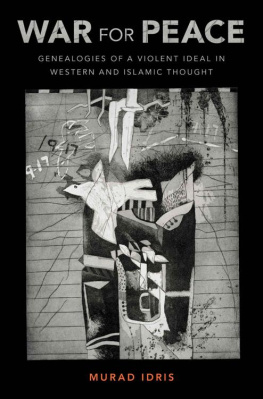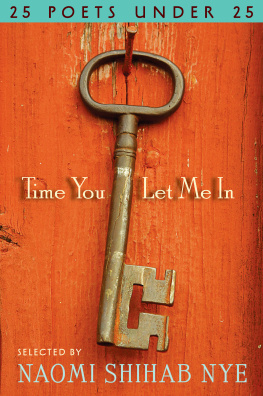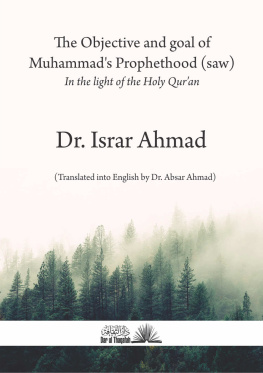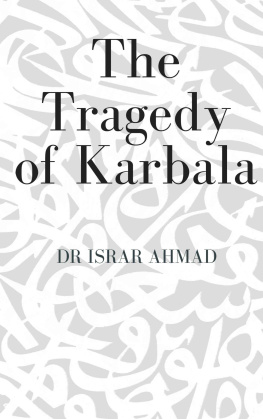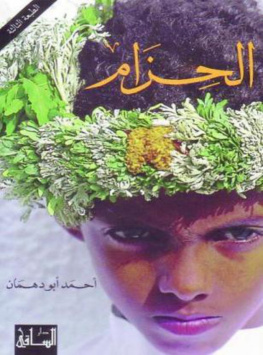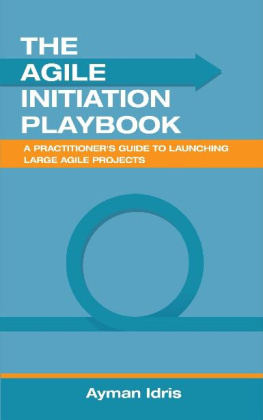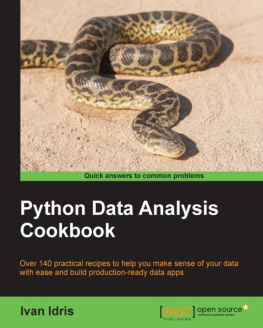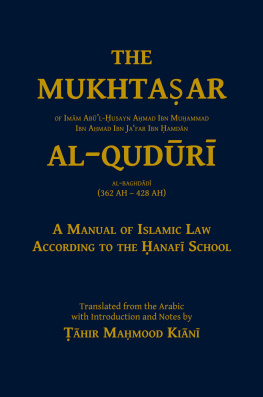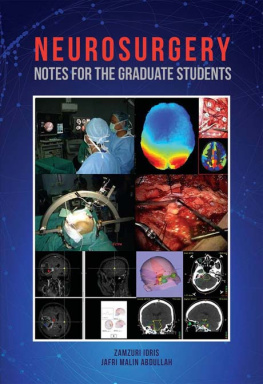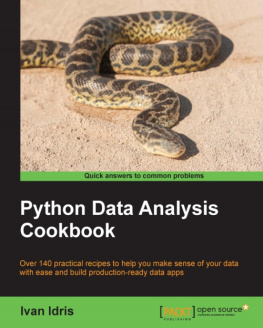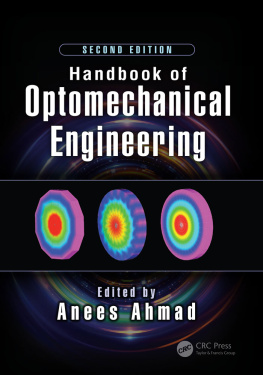al-Qarafi al-Maliki Shihab al-Din Ahmad ibn Idris - 2018;2017;
Here you can read online al-Qarafi al-Maliki Shihab al-Din Ahmad ibn Idris - 2018;2017; full text of the book (entire story) in english for free. Download pdf and epub, get meaning, cover and reviews about this ebook. City: New Haven;CT, year: 2018;2017;2017, publisher: Yale University Press, genre: Science. Description of the work, (preface) as well as reviews are available. Best literature library LitArk.com created for fans of good reading and offers a wide selection of genres:
Romance novel
Science fiction
Adventure
Detective
Science
History
Home and family
Prose
Art
Politics
Computer
Non-fiction
Religion
Business
Children
Humor
Choose a favorite category and find really read worthwhile books. Enjoy immersion in the world of imagination, feel the emotions of the characters or learn something new for yourself, make an fascinating discovery.

- Book:2018;2017;
- Author:
- Publisher:Yale University Press
- Genre:
- Year:2018;2017;2017
- City:New Haven;CT
- Rating:5 / 5
- Favourites:Add to favourites
- Your mark:
- 100
- 1
- 2
- 3
- 4
- 5
2018;2017;: summary, description and annotation
We offer to read an annotation, description, summary or preface (depends on what the author of the book "2018;2017;" wrote himself). If you haven't found the necessary information about the book — write in the comments, we will try to find it.
2018;2017; — read online for free the complete book (whole text) full work
Below is the text of the book, divided by pages. System saving the place of the last page read, allows you to conveniently read the book "2018;2017;" online for free, without having to search again every time where you left off. Put a bookmark, and you can go to the page where you finished reading at any time.
Font size:
Interval:
Bookmark:
The Criterion for Distinguishing Legal Opinions from Judicial Rulings and the Administrative Acts of Judges and Rulers
World Thought in Translation
A joint project of Yale University Press and the MacMillan Center for International and Area Studies at Yale University, World Thought in Translation makes important works of classical and contemporary political, philosophical, legal, and social thought from outside the Western tradition available to English-speaking scholars, students, and general readers. The translations are annotated and accompanied by critical introductions that orient readers to the background in which these texts were written, their initial reception, and their enduring influence within and beyond their own cultures. World Thought in Translation contributes to the study of religious and secular intellectual traditions across cultures and civilizations.
Series editors
Steven Angle
Karuna Mantena
Andrew March
Paulina Ochoa
Ian Shapiro
The Criterion for Distinguishing Legal Opinions from Judicial Rulings and the Administrative Acts of Judges and Rulers
al-Ikm f Tamyz al-Fatwan al-Akm wa Taarruft al-Q wal-Imm
Shihb al-Dn Amad ibn Idrs al-Qarf al-Mlik
Translated by Mohammad H. Fadel
Yale UNIVERSITY PRESS
New Haven and London
This publication was made possible in part by a grant from the Carnegie Corporation of New York. The statements made and views expressed are solely the responsibility of the author.
Published with assistance from the foundation established in memory of Philip Hamilton McMillan of the Class of 1894, Yale College.
Copyright 2017 by Mohammad H. Fadel.
All rights reserved.
This book may not be reproduced, in whole or in part, including illustrations, in any form (beyond that copying permitted by Sections 107 and 108 of the U.S. Copyright Law and except by reviewers for the public press), without written permission from the publishers.
Yale University Press books may be purchased in quantity for educational, business, or promotional use. For information, please e-mail (U.K. office).
Set in Adobe Caslon type by Newgen.
Printed in the United States of America.
Library of Congress Control Number: 2016961002
ISBN 978-0-300-19115-8 (hardcover : alk. paper)
A catalogue record for this book is available from the British Library.
This paper meets the requirements of ANSI/NISO Z39.48-1992 (Permanence of Paper).
10 9 8 7 6 5 4 3 2 1
For Reem and our beloved children,
Sarah, Laila, Fatima, and Ibrahim
Contents
Note on Transliteration and Usage
Throughout the text, I have employed a modified form of the International Journal of Middle East Studies transliteration system. I have, however, transliterated proper names throughout the translation. If an Arabic term, such as mufti, has entered the English language, I used the English spelling without transliteration. Dates are first provided by reference to the Islamic calendar, followed by the equivalent date according to the Common Era. Death dates are provided for individuals the first time they are mentioned in the text. I provide the original Arabic term in parentheses when translating a term of art.
Preface
As a graduate student at the University of Chicago, I became drawn to the study of Islamic law as a system of applied law, in response to the assumption of a prior generation of Islamic law scholars that Islamic law represented nothing more than a utopian ideal, not a practical system of regulating human society. Skeptical of this hypothesis, I decided to write my dissertation on Islamic law and legal process, focusing on post-twelfth-century Common Era jurists writing in Egypt, Syria, and North Africa and Andalusia (Muslim Spain). This seemed to be an ideal period to test the accuracy of the prevailing wisdom insofar as the jurists of this era were commonly believed to exemplify the derivative and utopian nature of later Muslim legal thought.
The decision to focus on Mlik law was more serendipitous than a matter of considered deliberation, but having begun my study of substantive Islamic law in earnest using Mlik texts, I took the path of least resistance and focused on Mlik doctrines regulating legal process. My dissertation relied primarily on a fifteenth-century Mlik treatise on adjudication, Tabirat al-ukkm. That work in turn made repeated references to various works of Shihb al-Dn al-Qarf, including al-Ikm f Tamyz al-Fatw an al-Akm, the work translated here.
My serendipitous interest in Mlikism was the product largely of my experience studying Arabic at the American University in Cairo in 1988 as a student in the Center for Arabic Study Abroad Consortium. The director of the program that year was Sherman Jackson, who was still a graduate student at the University of Pennsylvania. My relationship with Professor Jackson began that summer in Cairo but grew over the subsequent years as I pursued the study of Islamic law in my graduate studies more systematically. In the course of those studies, Professor Jackson introduced me both to al-Qarf, who was the subject of his PhD dissertation, and to his teacher of Mlik law in Cairo, Shaykh Hasan Salim Hasan Salih. Over the course of one summer and then one year in Cairo with the support of a Fulbright-Hayes dissertation-writing fellowship, I was able to complete the study of a basic Mlik work of law, al-Shar al-aghr, with Shaykh Hasan. The work I did in Cairo studying Mlik jurisprudence, along with Professor Jacksons groundbreaking work on al-Qarf, were crucial for my own dissertation on the study of the legal process in the Mlik school and my subsequent research on Islamic law, including, but not limited to, this current translation and interpretation of al-Qarfs articulation of what it meant, from an institutional perspective, to have an Islamic polity. I am deeply grateful to Professor Jackson, both personally and professionally, for having encouraged me to study Mlik law and for introducing me to Shaykh Hasan. It would have been extremely difficult (if not impossible) for an untrained graduate student to have navigated successfully the late medieval Islamic legal tradition that formed the subject matter of my dissertation, and ultimately led to this translation, without the initial assistance of a competent teacher.
My approach to the study of Islamic law, however, has also been deeply influenced by my formal legal education, which began shortly after I completed my dissertation in the fall of 1996, and my subsequent engagement with political liberalism, US constitutional law, and the relationship between religion and law in liberal states. Islamic law, from my perspective as a US-trained legal academic, is a site for exploring one approach to mediating and reconciling claims of the divine with those of humans, a task that is also fundamental to understanding the emergence of liberal political theory and constitutional regimes. Given my interests both in Islamic law and in political liberalism and liberal constitutionalism, when my friend and colleague Andrew March suggested I contribute a work on Islamic law to Yales new translations series, World Thought in Translation, I could think of no better piece to translate than al-Qarfs Ikm. Although it is a work that reflects the centrality of divine law to the polity of his day, in it Qarf describes a complex legal system in which human law necessarily plays a crucial role, not only in the articulation of divine law through interpretation but also through human institutions that mediate between competing conceptions of divine law and the common good. In his own way, then, he is trying to solve some of the same problems that animated early Enlightenment political thought, albeit al-Qarfs approach is legalisticand often, quite technically so. I offer this translation of his work, however, in the hope that it will render more accessible to a wider audience of readers a pre-Enlightenment Muslim thinkers approach to questions of divine and human sovereignty.
Next pageFont size:
Interval:
Bookmark:
Similar books «2018;2017;»
Look at similar books to 2018;2017;. We have selected literature similar in name and meaning in the hope of providing readers with more options to find new, interesting, not yet read works.
Discussion, reviews of the book 2018;2017; and just readers' own opinions. Leave your comments, write what you think about the work, its meaning or the main characters. Specify what exactly you liked and what you didn't like, and why you think so.

